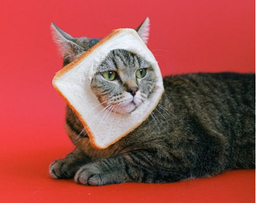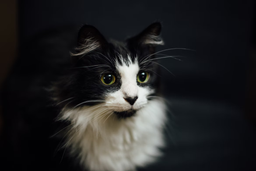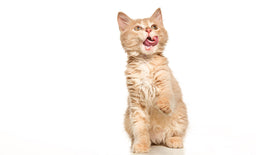Can cats eat onions? Get the answer from Untamed
For cat parents, onions are a delicious ingredient that improves the taste of any dish with their subtle combination of savoury and sweet kicks. Besides making our food delicious, this veggie is also super healthy for humans. If humans benefit from eating this allium vegetable, can cats eat onions too, or should you be worried if your cat had a bite?
Let’s tackle this issue and explain the risks of feeding onions to your feline friend. We will also cover what they should eat and which ingredients they should steer clear of so that you can create the best meal plan for your cat.
Are onions safe for kitties?
Onions, and all other allium vegetables, are extremely harmful to cats. Not only can they cause various gastrointestinal issues, but the consumption can also lead to serious medical conditions and even death.
All allium vegetables contain disulphates and thiosulphates that attack feline red blood cells, causing hemolysis—the destruction of erythrocytes. The result is hemolytic anaemia, which can have a fatal outcome if not treated immediately.
In case your cat ingests onions in any form, seek immediate veterinary help. If help isn’t sought on time, onion toxicity may end in death.

I usually want to try your food, but onions are a hard pass, hooman.
Source: Manja Vitolic
Can cats eat onion powder?
No—cats shouldn’t eat onion powder because dehydration makes the concentration of poisonous substances even higher. This popular product is consequently more dangerous than fresh onions.
Cats aren’t naturally attracted to the smell of onions and onion powder, but some tasty chicken seasoned with onion powder can be alluring to your furry friend. Make sure that your feline companion doesn’t eat your dinner leftovers because many human dishes contain large quantities of onion powder, which can poison your kitty quickly.

Five grams of onion per kilogram of a cat’s body weight is poisonous.
Source: Sincerely Media
How much onion is toxic to cats?
The general rule with onions is the larger the amount ingested, the greater the consequences. Specialists claim that five grams of onion per kilogram of your feline’s body weight are enough to cause serious harm.
Onion toxicity in cats can be triggered if they eat a large amount at once or consume smaller quantities over a longer period. As each case is individual, it’s not possible to determine the exact lethal dose.
The symptoms of onion poisoning
Cats aren’t attracted to allium vegetables, so they usually ingest the vegetable by having a bite of their parents' meal. Tiny amounts shouldn’t harm your kitty drastically, but they can cause some digestion issues.
If your cat eats more than a bite, you must monitor them closely to determine whether they exhibit any of the following symptoms:
- Panting
- Lethargy
- Hematuria (blood in the urine)
- Anaemia
- Vomiting
- Diarrhoea
- Dyspnoea (difficulty breathing)
- Elevated heart rate
Keep in mind that symptoms of onion toxicity may appear within a few days or even weeks after consumption, so it’s best to take your feline to the vet before the symptoms appear.
My cat ate an onion! What should I do?
If your cat eats an onion, the best course of action is to visit the vet. Follow these steps to ensure your cat gets the treatment they need:
- Gently remove any food from your cat’s mouth
- Try to determine how much onion your cat ate and at what time (this information will be important to your vet)
- Don’t try to induce vomiting
- Refrain from giving any water or food to your kitty
- Transport your furry friend to the vet clinic
How to prevent onion poisoning
Follow the rules presented in the list below to prevent onion poisoning in your cat:
- Keep all allium vegetables out of your kitty’s reach—Ensure that garlic, onions, shallots, and other allium vegetables are stored in a place your furry friend cannot reach
- Don’t share your food—However tempting, don’t give your food to your feline friend because many human dishes contain spices, such as onion and garlic powder
- Keep your furball out of the kitchen—When cooking lunch, make sure that your furry companion doesn’t have access to the food

I like an occasional nibble on the grass, but make no mistake, I don’t like fruits and veggies!
Source: cedar_biscuit_foxy_rebel
Can cats eat other fruits and vegetables?
Some fruits and vegetables are safe for feline consumption, but that doesn’t mean your kitty should eat them. Cats lack the specific enzyme to process plant-based products, and they cannot absorb any nutrients from plants.
Your cat may eat grass occasionally because it helps with digestion, but other than that, their diet should consist of meat. If you still want to share some food with your feline friend, check out which fruits and veggies are safe.
Vegetables cats can eat
If your cat likes vegetables, you can give them the following (in moderation):
- Broccoli—Because of its high fibre content, broccoli might be good for regulating bowel movement and calming an upset stomach. This vegetable must be cooked thoroughly before serving
- Pumpkin—Pumpkin may also help with digestion issues. Some vets even recommend it as a remedy for constipation
- Peas—As peas are safe for cats, many manufacturers add them to cat food as a filler. They sometimes help with bowel movements but can also cause diarrhoea if consumed in large amounts or often. Peas should be cooked before serving
- Cucumber—Cucumber can be served raw, and they are a good source of moisture. Offer cucumbers in small quantities and occasionally as too much of the veggie can cause diarrhoea
- Carrot—Cooked carrots are safe for cats, while raw ones present a choking hazard. They are rich in vitamins A, K, and B6, which should be good for eyesight
- Asparagus—This veggie can help kitties who have diarrhoea or constipation. Cook it before serving to avoid choking incidents. Too much asparagus can cause urinary tract problems because the vegetable is highly alkaline
- Zucchini—This plant is low in calories and high in water, making it a convenient snack for obese cats. Zucchini should also be cooked before serving
Fruits safe for feline consumption
Some fruits are safe for cats to eat, but they should always be served as occasional treats because they’re full of sugar. Frequent consumption can mess with your cat’s blood glucose levels and lead to unhealthy weight gain. Kitty-safe fruits are as follows:
- Bananas—You may give your kitty sliced bananas, both fresh or frozen. They are rich in vitamins B6 and C, potassium, and carbohydrates. They shouldn’t be served in excess as they can lead to obesity because of the high sugar content
- Watermelon—Cats can eat watermelon flesh, but all seeds should be removed as they are a choking hazard
- Strawberries—If you’re treating your furry friend to strawberries, keep the quantities small as they are high in sugar
- Pineapple—This fruit is safe for feline consumption, but since it is high in fructose, it should be served sparingly as frequent and large portions can cause obesity
- Berries—Blueberries, raspberries, cranberries, and blackberries are rich in antioxidants and fibre. If your cat likes them, you should serve them in bite-sized portions to prevent choking
- Apple—Apple flesh is high in calcium and vitamins C and K. Offer them as thin slices or bite-sized cubes and make sure that they don’t contain stems and seeds
- Cantaloupe—Cats like cantaloupe because it smells like meat to them. You can serve it as an occasional treat, but make sure that there’s no rind
- Mango—You can occasionally offer mango flesh to your furry friend, but make sure that the skin and seeds are removed. In most cases, cats won’t like mangoes (or any other fruit) because they can’t taste sweet

Animal protein is essential for your furry friend’s overall health.
Image (c) Untamed
What are the essential nutrients for cats?
Cats require a biologically-appropriate diet that fits their specific nutritional needs. Since they are obligate carnivores, their meals should be based on whole meat as it provides all the required nutrients, as follows:
- Animal protein
- Animal fat
- Moisture
- Vitamins
- Minerals
Animal protein
Top-notch cat food should consist of over 50% animal protein. Proteins are building blocks of organs and tissues and the most viable energy source for cats.
The essential amino acids, such as taurine and arginine, that cats need for energy, healthy reproductive system, skin and coat health, and proper organ function are only available in meat.
The best protein sources for felines come from poultry and fish. Beef and pork (and their derivatives like bacon and ham) are viable protein sources but should be served as occasional treats because they’re high in fat.
Animal protein is vital for weaning kitties because they need a high-protein and high-calorie diet to develop properly.
You should avoid feeding raw food (chicken, bones and eggs) as it can carry harmful bacteria, such as Listeria, Salmonella, and E. coli.
Animal fat
Animal fat is another viable energy source for cats, but it should take up less than 20% of your cat’s diet. Felines love fat because it tastes delicious. Fatty acids, such as omega-3, omega-6, and linoleic acid, are important for your kitty’s health. Fat also helps felines absorb vitamins A, D, E, and K more easily and maintain cell membranes, body temperature, and proper organ function.
Your kitty will go wild for ham and bacon, but you should provide cured deli meats as an occasional treat and in moderation because they’re high in fat and sodium. Overconsumption of fat can lead to obesity, while too much sodium can cause cystitis and struvite crystals.
Moisture
Your kitty probably doesn’t enjoy drinking water out of their bowl, but moisture is an essential part of your cat’s nutrition. To keep your feline hydrated, give them high-quality wet or semi-moist food with 78% to 82% moisture content.
If your feline friend’s diet is based on dry food, the risk of dehydration is pretty high. While cat kibble might be excellent for oral hygiene, it contains too many carbs and is heavily processed, making it unsuitable for your furry friend.
If your cat loves biscuits, mix them with wet food. That way, your furball will get enough moisture and all essential nutrients. If your kitty doesn’t want to eat wet food, you can combine cat kibble with soup or bone broth and add some wet food to their meals gradually until they get used to the taste.
Vitamins
Vitamins must be a part of your furball’s diet because they are essential for their health. Check out the details in the table below:
|
Vitamin |
Function |
|
Vitamin A |
|
|
Vitamin D |
|
|
Vitamin B1 (Thiamine) |
Maintains normal growth and nerve impulse transmission |
|
Vitamin B2 (Riboflavin) |
|
|
Vitamin B3 (Niacin) |
Maintains nervous system, gastrointestinal functions, and skin health |
|
Vitamin B6 (Pyridoxine) |
|
All vitamins vital for feline health are present in and best absorbed from meat.
Minerals
Minerals are crucial for enzyme production, pH balance, nutrient utilization, and oxygen transportation. Your feline needs the following:
- Magnesium
- Calcium
- Iron
- Chloride
Cats will get adequate amounts of these minerals from meat and fish.
Do cats need carbs?
Carbohydrates shouldn’t take up more than 3% of your furball’s diet. They are essentially useless to cats, especially those derived from plants. Felines cannot digest carbohydrates properly, nor can they absorb any healthy micronutrients from anything other than meat. Many food manufacturers use grains such as corn, wheat, potatoes, and rice in their cat food. It is best to avoid food containing too many carbs as overconsumption can cause obesity and digestive tract issues.
Carbohydrates may come in handy when your cat, who’s losing weight rapidly, needs to put on a few pounds. It can only be a temporary fix because cats need proteins and fat to gain healthy weight.

I like this new food, hooman. Can we please order more?
Image (c) Untamed
Want to make sure your cat gets the necessary nutrients? Try Untamed!
Do you want your kitty to have the best possible nutrition? We have what your feline friend needs—a delicious yet super healthy wet cat food with premium cuts of human-grade meat from ethical and cruelty-free sources with the best natural ingredients. Our food is prepared according to vet-formulated recipes for optimal nutrition. Untamed dishes include:
Our food offers twice as much protein as the average cat food product. Besides being rich in animal protein, Untamed dishes are free from useless fillers like sugar, grains, vegetables, and meat derivatives. We want to keep your cat healthy, so our products don’t contain common allergens.
Here's what your feline friend gets from Untamed:
- Various proteins—Our dishes contain chicken breast and liver, tuna, salmon, ham, mackerel, sardines, and shrimp, so your kitty can enjoy different flavours
- Yummy food—Kitties of all breeds, including Persians, Siamese, Bengals, Ragdolls, Maine Coons, and British Shorthairs, tested our food, and they went wild for it. As we preserve the aroma and flavour, our food will please the fussiest eaters
- Easy-to-digest meals—We don’t process our food heavily but gently steam it to preserve the taste and bioavailability of nutrients. Untamed dishes have a digestible soft texture suitable for seniors struggling with teeth loss and weaning kittens
We offer cat food with free shipping, and our products arrive in 100% recyclable packaging. Take our TRY NOW quiz to tailor the perfect meal plan for your feline friend and order a starter pack of Untamed products at the best price.
Why should you choose Untamed? Here’s the reason!
As dedicated cat parents, we wanted to create cat food with long-term health benefits. Here’s what you can expect after switching your cat to Untamed:
|
Period on Untamed |
Health benefits |
|
One week |
|
|
Two months |
|
|
Four months |
|
|
Six months and up |
|
Ready to treat your cat to Untamed? Here’s how to do it
Forget about searching for the perfect food in numerous pet shops because Untamed delivers right to your doorstep. All you need to do is:
- Complete the questionnaire to tell us about your cat’s:
- Eating habits
- Allergies
- Taste preferences
- Life stage
- Select a meal plan
- Place your order
We'll have the cat food delivered within a day, and if your furry friend likes our meals, we will replenish your supplies around the same time every month. You can modify, skip, postpone, or cancel your order at any time.
What cats shouldn’t eat
Your furry friend is an obligate carnivore, and they need a well-balanced diet of protein and fat to thrive. Some products don’t agree with their sensitive digestive tract, so your cat should skip:
- Dairy products—Apart from an occasional bite of yoghurt, your kitty should keep away from dairy products. Cats are usually lactose intolerant, so dairy can cause severe stomach and digestion issues
- Caffeine—Felines should never drink coffee as they are sensitive to its effects. Even the tiniest amount can be poisonous to your furry friend. Caffeine poisoning manifests in restlessness, breathing difficulties, irregular heartbeat, and muscle tremors. Caffeine is also present in chocolate, so you should keep it away from your kitty
Check out our other guides to what cats can or cannot eat:
|
|

![Best food for Ragdoll cats in the UK [Broken Down]](http://untamed.com/cdn/shop/articles/featured_best_food_for_ragdoll_cats_uk.jpg?v=1646818249&width=256)

